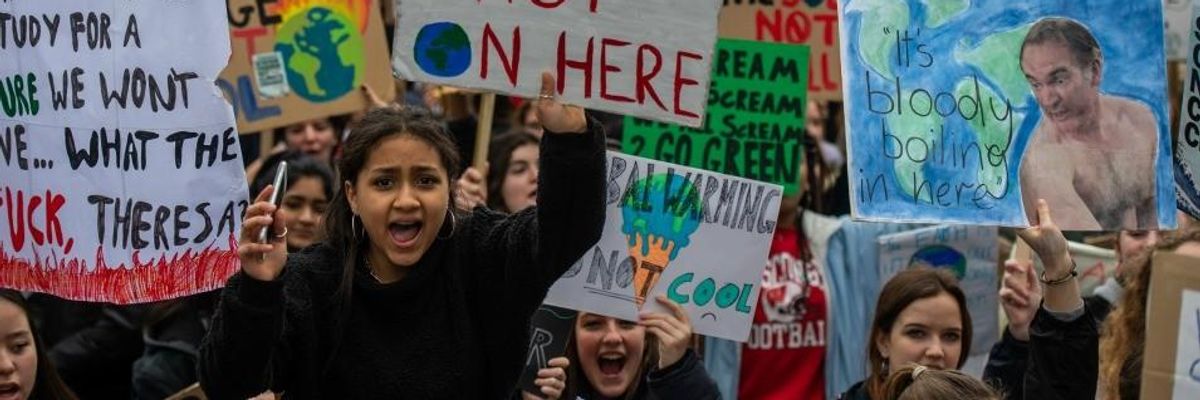The famous anthropologist, Margaret Mead, once said to me that children have a distinct moral authority to change some of their parents' habits or opinions. She gave use of seat belts and smoking cigarettes as examples.
Indeed, most of us know instances when sons and daughters have looked into the eyes of their fathers and mothers and urged them to wear their seatbelts or stop smoking. They say in their own plaintive way that they want mommy and daddy around for them. Many mothers and fathers have had such experiences.
The rising tide of worldwide protests in recent months by young students cutting classes to shake up their elders should be a wakeup call and a sign of more activism on the horizon.
Many parents and corporate executives are doing slow motion dances round global climate disruptions, despite the brutally visual and scientific evidence of our climate crisis. The rising tide of worldwide protests in recent months by young students cutting classes to shake up their elders should be a wakeup call and a sign of more activism on the horizon. Earth Day on April 22nd should give them another visible platform.
Last year the Global Youth Climate Strike manifested itself in Sweden, where it was started by a then fifteen year old teenager, Greta Thunberg. Every Friday she stood in silent protest outside the historic Swedish Parliament in Stockholm.
On March 15, an estimated 150,000 European students left school to protest. In Sweden, Germany, France, Britain, and other countries, these youngsters admonished adults, who have the power to urgently diminish greenhouse gases by cutting the use of coal, oil, and gas, and expanding the use of renewables and energy conservation.
In India, demonstrations were about the suffocating air pollution. In South Africa, protestors spoke about the worsening droughts.
At a rally in Washington, DC, eight year old Havana Chapman-Edwards told protestors at the U.S. Capitol: "Today we are telling the truth and we do not take no for an answer," according to the New York Times.
Protestors already see the truth in the South Pacific's rising sea levels and the Arctic Circle's melting ice.
These youngsters can argue their case with facts and figures, with stories of record-setting fires, floods, tornados, and hurricanes and species extinctions. But they are viscerally feeling the impact of climate crisis and fearing for their lives before reaching middle age.
As University of Maryland Professor Dana Fisher told the Times, children are afraid of the tumultuous world they will inherit. Their elders are not protecting them.
The people of our tormented Planet must pull together as if there was an impending invasion from Mars.
Greta, the emerging spokesperson for this escalating youth agitation put it wisely: "There is a crisis in front of us that we will have to live with for all our lives, our children, our grandchildren, and all future generations." The movement has much more room to grow, but we are depending on them developing a strong, organized voice, while retaining their individual spontaneity.
Not surprisingly, climate deniers took to social media to falsely declare that environmental groups were using the students. In fact, this outburst was quite commendably a result of students taking what they've learned seriously.
In England, students are insisting their government declare a state of emergency to highlight the severity of the threat. They want more material on global warming in their national school curriculum.
Some teachers and principals in the U.K. don't like students missing classes and are trying to block or penalize those who do. But many school leaders are approving such brief intermissions to help save the planet. Sixteen year old Bonnie Morely decried the politicians for being "asleep at the wheel. We have to wake them up and I think thousands of kids on the streets will do just that."
How about millions of them! Their numbers are growing, with some demonstrations reaching tens of thousands. In France, over 2 million students signed petitions. Some politicians are chiding them about the costs of their demands, as if energy pollution and toxic waste are not costly to people, as if the costs of violent weather patterns aren't costing huge sums of money and lives already.
In Brussels, Belgium, 18 year old Liam pointed to "a growing momentum," but he told a Times reporter maybe it should become more disruptive to attain more attention. "Maybe we should change the timing of the protests to rush hour."
Fortunately, the urgent pathways to be pursued are full of favorable economic efficiencies and good jobs.
The youngsters understand the problem and want solutions now to counter the current omnicidal lethargy. Although some companies get it--such as the sterling Patagonia and Interface corporations in the U.S.--most large companies either are resisting, engaging in "greenwashing" lip service, or taking the smallest of steps for public relations purposes.
The people of our tormented Planet must pull together as if there was an impending invasion from Mars. Fortunately, the urgent pathways to be pursued are full of favorable economic efficiencies and good jobs. Think of solar energy installations, weatherizing homes and other buildings, modern public transportation, grants to speed up climate chaos mitigation, and economies moving to net or even negative carbon impact. The known remedial technology is far ahead of its mandated applications by sluggish legislators and their myopic corporate paymasters.
Children can and do communicate with each other often and freely around their community, country, and globe. The faster trivial text messages are replaced by texts calling for a relentless call to action, the better. Students taking to the streets and taking on legislators will advance the fight for a safer planet and a more just society.
Stay tuned! This is only the beginning of the world's children raising adults to a maturity that faces the awful, onrushing realities.

